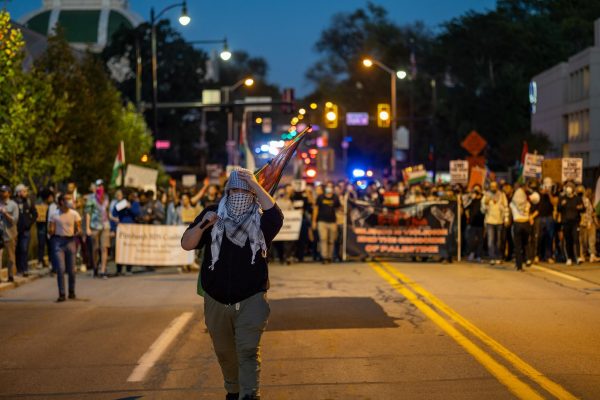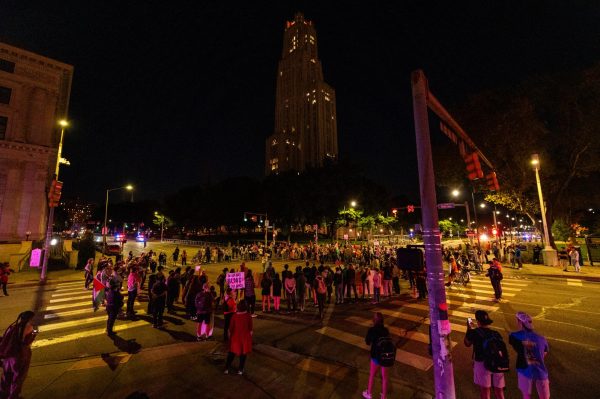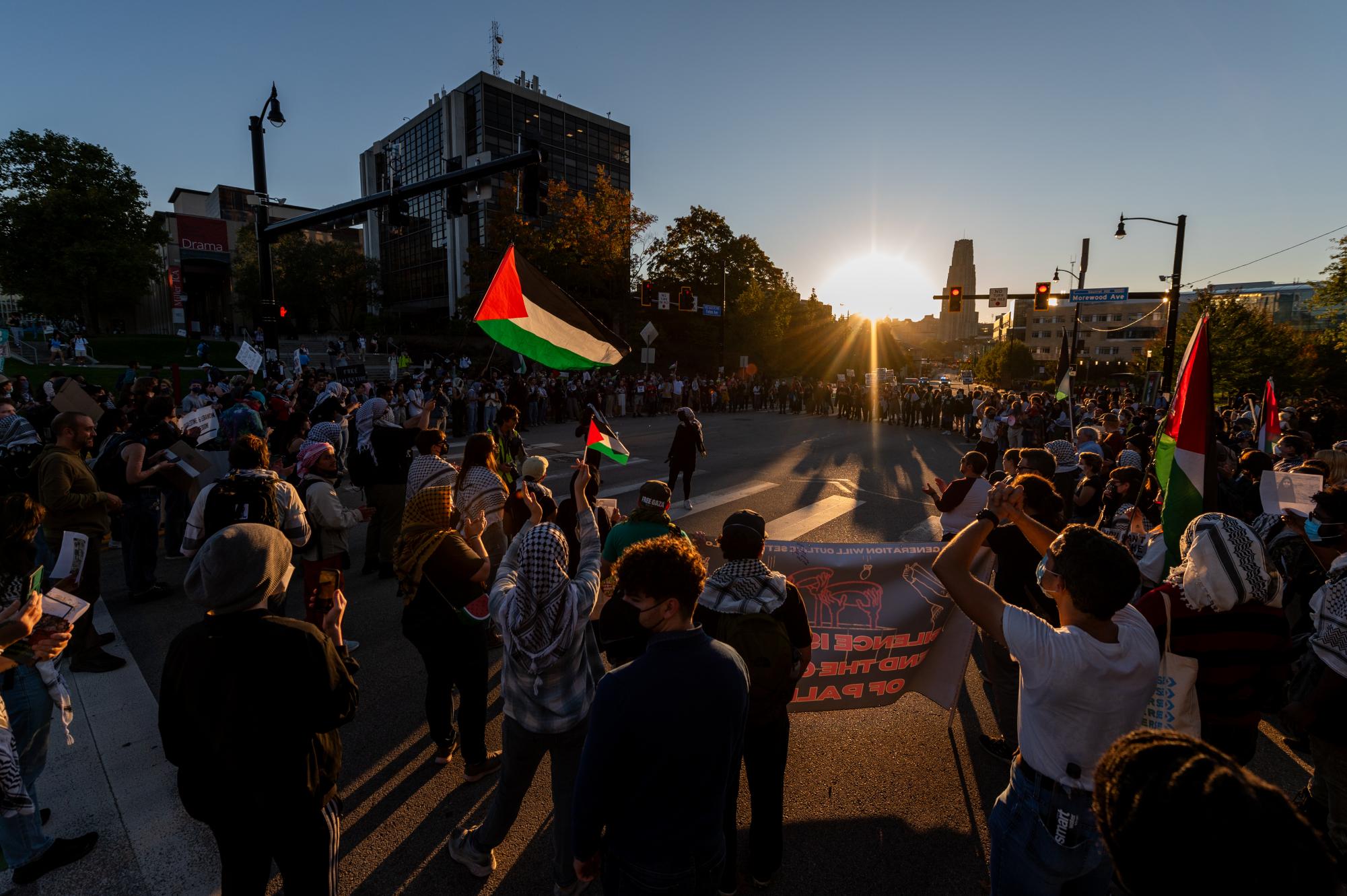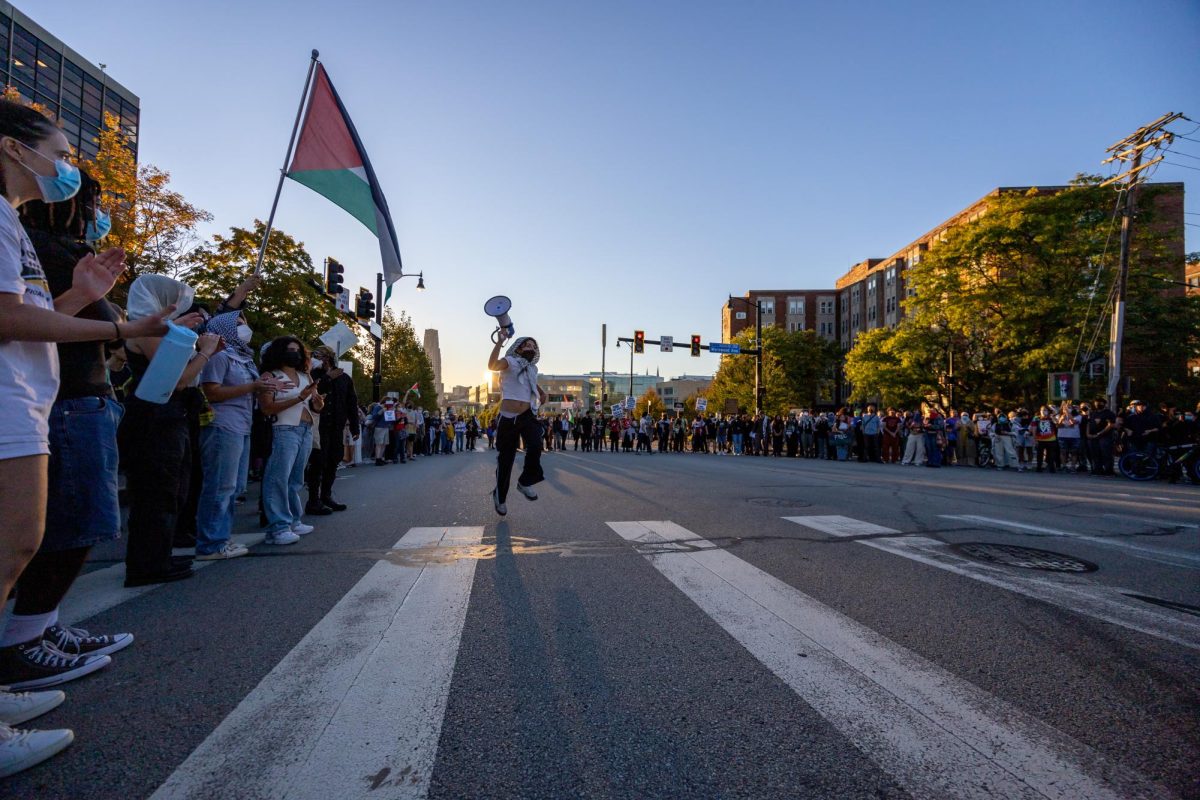About 250 students, alumni and community members marched in solidarity with Lebanon and Palestine on Thursday evening in a demonstration organized by several pro-Palestinian activist organizations. They began on Forbes Avenue at the Carnegie Museum of Art and marched to Morewood Avenue where they turned onto Fifth Avenue and ended at the intersection of Fifth and Bigelow Boulevard.
The march comes days after the Israeli military began a ground offensive in Lebanon. As of Oct. 3, 1.2 million people in Lebanon have been displaced and more than 1,300 have been killed by Israel’s airstrikes and ground offensive, according to NBC.
Elyanna Sharbaji, a Pitt alumni, said she is a Syrian refugee with family currently in Syria and Lebanon. She said she talks to her family everyday and is “always worried about them.”
“For days, I’ve been looking at my text messages, my family group chat and I’m like, ‘Can I get any message that I lost them,’ because everyday, we are at risk of losing our family members,” Sharbaji said. “It’s really hard to feel like you’re going to wake up one day and your family’s dead, you can’t hear anything about them, they’re not there anymore.”
Sharbaji said she feels an obligation to protest for Palestinians and Lebanese people because “their voices are not heard.”
“Everyone from the Middle East is under attack, everyone is dying [and] they’re being killed by American bombs,” Sharbaji said. “It makes me feel sad that no one knows what’s happening, but at the same time, it makes me want to speak up, because I know none of them know what’s happening.”

As protesters marched past the Cathedral of Learning, organizers led chants of “disclose, divest, we will not stop, we will not rest.” Karim, a doctoral student at Pitt, said he has family that is currently displaced in Lebanon.
“I’m furious about a government that is enabling this,” Karim said. “I’m a resident of the United States, and I indirectly contribute to this war, to the bombs. There is a collective responsibility. We have to hold this war and put it to a stop.”
Using a megaphone, Karim talked to the encircled marchers about Julia Ramadan, a Lebanese woman who was killed as a result of the conflict.
“She’s a 30-year-old social worker who was helping displaced people in her own home, and then her home was bombed and she was killed under the rubble,” Karim said. “I decided to speak her story, and people were moved, and they decided to sit down, because if they’re under the rubble, then our streets can’t simply be empty.”
While Karim spoke, about 60 people laid in the circle on the road near Carnegie Mellon University. Some passed around a tube of red paint, which they smeared on their hands. Ilyas Khan, a junior linguistics and fine arts major at CMU, said they joined to “encourage people to have empathy.”
“When people can see [it] in front of them … they can better empathize with that suffering,” Khan said. “There is a physicality of the body, place on the ground, the space that it takes up that we don’t really see on the internet.”
Khan said he hopes for more people to engage in “acts of radical empathy.”
“I think that encouraging people to take action however they can, however they are able, whether it is by physically putting yourself and your body in the road, or whether it is by simply doing what you are best at, that is what I want to encourage each and every person, every university to do right now, starting today,” Khan said.
Throughout the march, organizers handed out photos of people killed by the Israeli military in Gaza and Lebanon. Demonstrators held up these photos while marching through the streets.
A Students for Justice in Palestine co-president, who was granted anonymity for safety reasons, stated their “demands for divestment have not changed whatsoever.”
“The genocide in Gaza has been going on now for a year,” they said. “We’re here showing that we’re not letting up pressure until this institution, this government, stops sending weapons to Israel to commit a genocide.”
Toward the end of the march, demonstrators gathered at the intersection of Fifth Avenue and Bigelow Boulevard and chanted “Judaism yes, Zionism no — the state of Israel has to go.”

The co-president said they “weren’t expecting [the turnout] to be this big,” but emphasized the impact of seeing “how many still care … one year into this.”
“Even seeing people from CMU, seeing people from the community, it truly shows this is not just a student movement, this is a broader movement,” they said.
Al Hart, a retired Electrical Workers Union representative from Stanton Heights, marched in the rally carrying a sign that read “unions demand arms embargo of Israel.” Hart mentioned that his union endorsed the BDS movement nine years ago and said “we’re very committed to the Palestinian cause.”
Hart said he hopes to “keep the fight going” and make people and politicians understand “that this is outrageous.”
“If the United States stopped funding it and stopped arming Israel, all of this would end tomorrow,” Hart said. “So I’m here as an American saying I’m fed up with this, and this needs to stop.”



